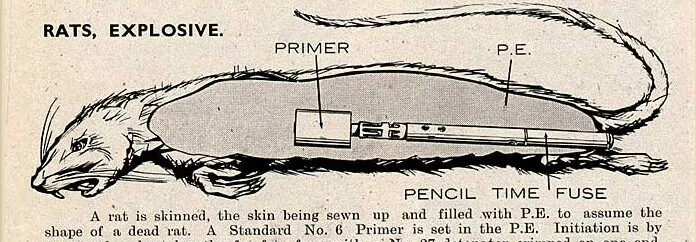CFP
Call for papers:
The Hidden Second World War: Cultural Depictions of Irregular Warfare and Covert Action
British covert operations of the Second World War have provided source material for a string of recent films and TV series, with Operation Mincemeat (2021), SAS Rogue Heroes (2022-), and The Ministry of Ungentlemanly Warfare (2024) all attracting media coverage and public debate. This recent wave joins and revises a longer tradition of cultural representations of the secret aspects of the war, across fiction, memoirs, cinema, television, and latterly digital gaming.
Given the current prominence and valorisation of covert action, it is easy to overlook the fact that perceptions of the field have fluctuated. As Richard Aldrich has noted, during and after the Second World War senior British military officers repeatedly expressed views that special operations were a ‘soft option’, with one general infamously suggesting that these offered a ‘too-easy […] form of gallantry’ taken up by a ‘few anti-social irresponsible individualists, who sought a more personal satisfaction from the war than of standing their chance, like proper soldiers, of being bayoneted in a slit trench or burnt alive in a tank‘.
To track this evolution, we are soliciting papers towards a publication with the working title ‘The Hidden Second World War: Cultural Depictions of Irregular Warfare and Covert Action’. The impetus for this emerges from the current Leverhulme Trust-funded project, ‘The SOE, Covert Action, and the British Cultural Imaginary’. While we welcome proposals that address the Special Operations Executive (or other British agencies), our ambition in this collection is to expand the focus to encompass a range of national and international contexts, agencies, and operations. We therefore encourage proposals that address this theme in the context of other Allied or Axis countries, including combatants such as the USSR, China or Japan, and/or explore how such activity intersects with resistance movements or insurgencies in theatres in and beyond Europe.
We welcome analysis across media and genre forms, as well as contributions that consider non-fictional engagements with the relevant themes (e.g. life writing, reportage, documentary making, museums and exhibitions, or public commemorations and memorials).
The following is a non-exclusive suggestion of the topics that papers might address:
- Depictions of specific operations, comparisons to source materials, and evolution of depictions across different narratives;
- Comparative understandings of the cultural legacies of irregular warfare and covert action across different national traditions;
- The framing of such activity through popular genre conventions; or the disruption of such conventions through narratives deploying (e.g.) irony, pastiche, or anachronism;
- Claims made by such narratives to history, authenticity, archival accuracy, biographical fidelity and/or how audiences have received and debated such histories;
- Discussions of the continuities, revisions, and breaks in such narratives across evolving media forms;
- Analysis of how subsequent historical, geopolitical, or military contexts have affected the framing of Second World War narratives;
- The subsequent politics of covert action; how the cultural legacy of Second World War activity has been used to frame or legitimise post-war operations or debates; how those who conducted such irregular warfare drew upon (or hid) such service in post-war civilian careers.
Potential contributors are requested to send an abstract of 300-500 words, along with a brief biographical note or CV, to Guy Woodward (guy.t.woodward@durham.ac.uk) by 1 February 2026. Selected contributors will be contacted by 1 March, with the ambition that final papers of 7000-8000 words will be due 1 October 2026.
While the ultimate venue for publication is still to be confirmed, we have had initial contact with a well-established peer-reviewed journal and have been invited to submit a proposal.
We welcome submissions by established and emerging scholars. We also welcome approaches from different disciplinary perspectives. Given the aims of the publication, we particularly encourage papers which seek to engage with readers and debates outside of sub-specialisations and overly narrow case studies.
